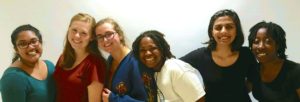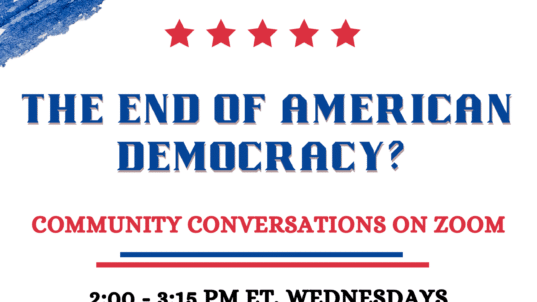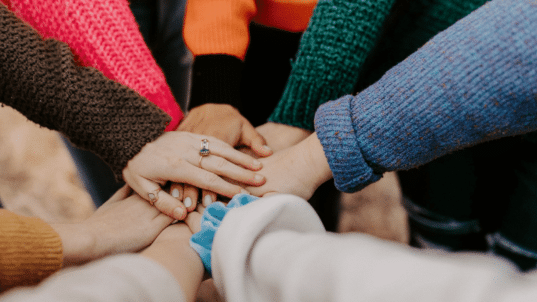 By: Melanie Doherty, Ph.D.
By: Melanie Doherty, Ph.D.
Associate Professor of English and Faculty Diversity Liaison, Wesleyan College, Macon, GA
With guidance from a pair of campus co-directors and the support of the Interactivity Foundation (IF), a team of six student facilitators kicked off a pilot series of Diversity and Inclusion Discussions (DID) in the fall of 2016 at Wesleyan College in Macon, Georgia. Since 2012, Wesleyan has worked with the Interactivity Foundation to integrate student-facilitated discussion teams into WISe 101, a required first-year seminar. This revitalization of the first-year seminar has led to marked improvements in students’ engagement with and ownership of their education. Given the success of the IF discussions in WISe 101, the IF logics of sanctuary, “yes…and,” and divergent thinking have become a tested and reliable component of many of Wesleyan’s small seminar-style courses. Now students were looking for a way to take exploratory IF discussions out of the classroom. This fall, as Wesleyan faced growing tensions concerning race and class inequalities in the U.S. both nationally and on campus, we again turned to the skills we’ve learned from the IF method to create constructive campus conversations on diversity and inclusion. We saw the productive potential in our students’ sense of frustration and desire for change. We decided to use the IF discussion process to channel that energy into problem-solving conversations in our pilot program of student-led Diversity and Inclusion Discussions.
 Tonya Parker, Assistant Dean of Students for Diversity and Inclusion, and Melanie Doherty, Associate Professor of English and Faculty Diversity Liaison, created the Diversity and Inclusion Discussions (DID) pilot program based on previous experience with IF. We planned for a training day in IF approaches, four main student-led discussions, and a capstone meeting with faculty, staff, and administration. We also created a guidebook with readings on conflict resolution, organic leadership, persuasion skills, workplace communication, group dynamics, and the role of games and play in education. For our discussion facilitators, we chose six student leaders who represent a broad cross-section of the student groups on campus, including the former president of the Black Student Alliance, the current president of the Gay Lesbian Bisexual Alliance, the president and vice-president of the Student Government Association, and Campus Ministry Assistants and members of the Council for Religious Unity. Beginning with a six-hour “boot camp” workshop in September, the six student facilitators quickly and enthusiastically embraced their new leadership roles. They designed IF discussions for teams of 8-10 of their fellow students with the following goals in mind:
Tonya Parker, Assistant Dean of Students for Diversity and Inclusion, and Melanie Doherty, Associate Professor of English and Faculty Diversity Liaison, created the Diversity and Inclusion Discussions (DID) pilot program based on previous experience with IF. We planned for a training day in IF approaches, four main student-led discussions, and a capstone meeting with faculty, staff, and administration. We also created a guidebook with readings on conflict resolution, organic leadership, persuasion skills, workplace communication, group dynamics, and the role of games and play in education. For our discussion facilitators, we chose six student leaders who represent a broad cross-section of the student groups on campus, including the former president of the Black Student Alliance, the current president of the Gay Lesbian Bisexual Alliance, the president and vice-president of the Student Government Association, and Campus Ministry Assistants and members of the Council for Religious Unity. Beginning with a six-hour “boot camp” workshop in September, the six student facilitators quickly and enthusiastically embraced their new leadership roles. They designed IF discussions for teams of 8-10 of their fellow students with the following goals in mind:
- A teaching component focused on content from the DID Guidebook, which contains articles that build on the fundamentals of the IF method and go deeper into areas relevant to diversity and inclusion problem-solving skills
- A discussion component based on topics culled from student feedback during group work
- A reflection component which brought the highlights of the small group discussions back to the larger group
Over the course of the fall semester, the four two-hour DID discussion sessions helped students to articulate their own experiences and ideas, as well as envision changes in Wesleyan’s diversity and inclusion programming. Using the IF method, which encourages students to create a sense of sanctuary, think creatively, and explore divergent possibilities, we were able to obtain unfiltered and honest student feedback about the current campus climate. At the end of the semester, the six student facilitation leaders modeled their discussion process and presented student feedback to faculty, staff, and administrators at a powerful and persuasive Faculty and Staff Development Workshop. The student facilitators articulately argued for policy changes they would like to see across campus. They wowed the faculty with their dedication and leadership skills. After four successful discussion meetings with impressive student turnout and participation, our student facilitators and group members proudly said, “We DID it!” with the help of the Interactivity Foundation.



